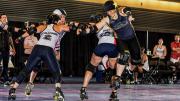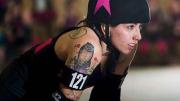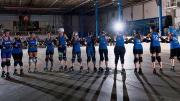When not holed up in a Harvard chemistry lab, fifth-year graduate student Cristin Juda lets loose as her alter ego, “Brutyl Lithium.” The Boston Roller Derby track name is a play on the compound tert-Butyllithium, she says with a smile: “When it comes into contact with air, it catches on fire.”
That’s a handy trait for playing a rigorous sport rooted in targeted aggression and strategic containment. Two five-player teams skate furiously around a track in the same direction while the designated “jammer” from each side fights to get past the pack of opposing “blockers” without being knocked out of bounds. As everyone plays offense and defense simultaneously, and boundaries shift with the pack, the action can get chaotic. About 18 officials are required to run a given game, and strict rules govern hitting.
Skaters can’t use elbows, hands, head, or feet, or “hit directly in the back or the face, or below the knee,” says Erica Viscio, graphic designer and marketing coordinator for Harvard Medical School’s office of global education. “You use your body, usually hips or shoulders, to initiate contact. I have bruises, and my face is a bit scratched, so it can get a little rough,” she allows, but “I grew up playing sports with the boys and it was nice to play with women—and have that intense physical outlet when going to the gym doesn’t really cut it.”
An estimated 1,200 amateur roller-derby leagues for women, men, and juniors compete across the globe. American derby’s origins date to popular roller-skating marathons in the 1930s, which then morphed into a “kitschy sport that appealed to nontraditional sports fans: skaters wore fishnets and tutus and put on sort of a stage show,” says Viscio, who plays as “Maul” (short for “Agent MauledHer,” inspired by the X Files protagonist) for the Boston Massacre team that last year won the Division II world championship against Paris.
That campy element still exists, but has waned since the mid 2000s, when roller derby began to emerge as a more serious competitive sport—it was short-listed for inclusion in the 2020 Olympics—played predominantly by women.
Boston Roller Derby, among 400 leagues in the Women’s Flat Track Derby Association, began in 2005 and has since grown to seven teams as well as a junior-level training program, headquartered at a warehouse in Lynn. Games are played at Shriners Auditorium, in Wilmington, except those in May and June, which are held at Cambridge’s Simoni Skating Rink.
The all-volunteer league (only some game officials are paid) is a tight-knit community. “Not only do you practice with the team three to five days a week,” Viscio says, “we travel and train together.” She and Juda also coach and teach. “Graduate school is very stressful, and this is a sport where you can really get out your frustration,” says Juda, a blocker with the Cosmonaughties. “People outside of the derby community think I’m really tough. Roller derby does build confidence—knowing you can play a contact sport,” but for her the appeal also lies in its “welcoming environment. People are very open-minded and tolerant. It’s a sport where you can be whoever you want to be.”
Viscio joined Boston Roller Derby when she moved from Vermont for her Harvard job, not knowing a soul. “I thought it would be a good way to make some new friends,” she says, “and it turned into this incredible adventure that has altered the entire course of my life.”












